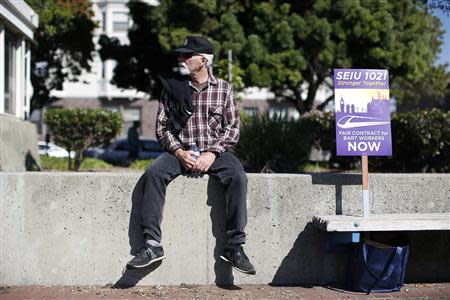Accident kills two San Francisco rail workers on second day of strike
By Laila Kearney SAN FRANCISCO (Reuters) - Two workers performing maintenance on the San Francisco commuter rail system were killed when a train struck them on Saturday, on the second day of a strike against the system that has snarled traffic across the region. A Bay Area Rapid Transit agency employee and a contractor were checking a possible dip in the track just north of the station in suburban Walnut Creek when they were struck and killed by a BART train operating on automatic control during a maintenance run, the agency said in a statement. A BART spokeswoman could not immediately say if either of the two people killed was a member of a union on strike against the agency. Unionized BART employees walked off the job on Friday after new contract talks broke down over pay increases and workplace rules, shutting down a system that carries some 400,000 passengers a day. The two sides had not agreed to resume talks as of Saturday morning, according to spokeswomen for the two main unions involved. "We have nothing scheduled at the moment," said Cecille Isidro, spokeswoman for the Service Employees International Union. The BART walkout is the second this year, after the agency's workers went on strike for four and a half days in July. Their unions and BART management were unable to reach a deal in the following months. Experts say the strike will be an economic drag. The July work stoppage caused from $73 million to $100 million a day in lost productivity for riders, said Rufus Jeffris, spokesman for the Bay Area Council, which studies the local economy. Unions announced the latest strike on Thursday, and a federal mediator ended efforts at conciliation, saying there was no more he could do. Little progress has been made since then, and the two sides did not meet at all on Friday. Union leaders held a news conference on Friday afternoon, unveiling what they called a new set of proposals that could end the strike later that night if BART officials accepted them. But BART officials said in a written statement they could not agree to the unions' "ultimatums," calling the proposals essentially the same offer that had already been rejected. Union negotiators have demanded large pay raises, in part to offset being asked to contribute to their pensions and pay more for healthcare. Under the terms of the last contract offer that has been made public, BART said it offered a 12 percent pay raise over four years to workers, who management says earn on average $79,000 a year, plus benefits. The unions put the average worker's salary at $64,000. Union leaders have justified their demands for higher pay in part by pointing out that San Francisco is among the 10 most expensive U.S. cities in which to live. After negotiating late every day this week, the unions said the sides had finally reached an overall understanding on pay and benefits, but were at odds over workplace rules the unions said BART had proposed at the last minute. 'MAD AS HELL' But Grace Crunican, BART general manager, said in a written statement on Friday that the work rules had been an issue for six months and were critical to the rail system's operation. "Using computers instead of manually recording and transmitting information is essential in the technology age," she said. Crunican also suggested that union leaders had mischaracterized the nature of the disagreement in the press. "The unions grabbed the salary offer, but balked at the work rule changes. While BART and the mediators were still at the table, union leaders announced a strike to the media. They offered to submit to binding arbitration on work rules and falsely announced an agreement on salary," she said. The proposed workplace rules at issue included allowing same-day schedule changes, eliminating marginal pay increases for certain senior custodial staff and scrapping past practices that included guidelines for how an injured worker would be integrated back onto the job, said Service Employees International Union spokeswoman Isidro. Commuters expressed frustration at the stalemate. "I am mad as hell. It's a big hassle - thanks to BART," said Jurgen Ware, who lives in the Bay Area suburb of Dublin and had to carpool to his job in San Francisco on Friday. He also blamed rail workers, saying they "have a stranglehold on the city." After the July walkout California Governor Jerry Brown, a Democrat, obtained a court order preventing another strike for 60 days. But that order has expired and Brown would have to call a special session of the legislature to make another attempt to force an end to the work stoppage. "An extraordinary special session, at this point, would not lead to the quick solution the people of the Bay Area want and deserve," Brown spokesman Evan Westrup said in an email. BART commuter rail service helps alleviate car traffic in San Francisco, which ranks as the third most congested metropolitan area in the nation after Los Angeles and Honolulu, according to roadway traffic software company INRIX Inc. (Additional reporting by Poornima Gupta, Noel Randewich, Braden Reddall, Alex Dobuzinskis, Ronnie Cohen, Dan Whitcomb and Jonathan Allen; Writing by Dan Whitcomb; Editing by Alistair Lyon, Mary Wisniewski and Eric Walsh)


